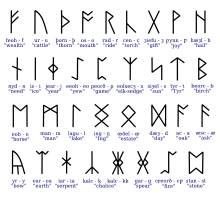rune
English
Etymology
Borrowed from Old Norse rún, which is from Proto-Germanic *rūnō (“letter, literature, secret”), which is borrowed either from Proto-Celtic *rūnā or from the same source as it; compare Dutch rune, German Rune and Swedish runa. Compare roun.
Pronunciation
- enPR: ro͞on, IPA(key): /ɹuːn/
Audio (US) (file) - Rhymes: -uːn
Noun
rune (plural runes)
- A letter, or character, used in the written language of various ancient Germanic peoples, especially the Scandinavians and the Anglo-Saxons.
- 1971, Richard Carpenter, Catweazle and the Magic Zodiac, Harmondsworth: Puffin Books, page 32:
- "Finding you somewhere to live isn't going to be easy," he said. "We must cast the runes," said Catweazle. "They will tell us."
-
- A Finnish or Scandinavian epic poem, or a division of one, especially a division of the Kalevala.
- A letter or mark used as a mystical or magic symbol.
- 2016, Jeph Jacques, Questionable Content (webcomic), Number 3242: The Dunkelest Brau:
- "Are the, um, eldritch runes supposed to glow like that?" "Dunno. I asked the distributor about 'em and he started shaking really fast like in a Tool video."
-
- A verse or song, especially one with mystical or mysterious overtones; a spell or an incantation.
- 1891, Mary Noailles Murfree, In the "Stranger People's" Country, Nebraska 2005, page 15:
- the fiddle sang and sang as ceaselessly as the chanting cicada without, and the frogs intoning their sylvan runes by the waterside.
- 1891, Mary Noailles Murfree, In the "Stranger People's" Country, Nebraska 2005, page 15:
- (obsolete) Alternative form of roun (“secret or mystery”).
- (programming, in the Go programming language) A Unicode code point.
- 2016, Shiju Varghese, Go Recipes, Apress, →ISBN, page 12:
- Go language defines the type
runeas an alias for the typeint32to represent a Unicode code point. A string in Go is a sequence of runes.
-
Derived terms
Derived terms
- bind rune
- moonrune, moon rune
- runecarver
- runecast, runecaster, runecasting
- runecraft
- runed
- runeless
- runelike
- runelore
- runemaster
- rune poem
- rune-rister, rune-risting
- runesmith
- runesong
- runestaff, runestave
- runester
- runestone
- runework
- runic
- runically
- runiform
- runography, runographer, runographic
- runology, runologist
- slavrune
- twig rune
Translations
letter or character
|
- The translations below need to be checked and inserted above into the appropriate translation tables. See instructions at Wiktionary:Entry layout § Translations.
Dutch
Pronunciation
- IPA(key): /ˈrynə/
Audio (file) - Hyphenation: ru‧ne
- Rhymes: -ynə
Derived terms
- runenschrift
- runenteken
French
Pronunciation
- IPA(key): /ʁyn/
- Rhymes: -yn
Derived terms
Descendants
- → Turkish: rün
Further reading
- “rune”, in Trésor de la langue française informatisé [Digitized Treasury of the French Language], 2012.
Italian
Pronunciation
- IPA(key): /ˈru.ne/
- Rhymes: -une
- Hyphenation: rù‧ne
Middle Dutch
Etymology
From Old Dutch *rūna, from Proto-Germanic *rūnō.
Inflection
This noun needs an inflection-table template.
Further reading
- Verwijs, E.; Verdam, J. (1885–1929), “rune (I)”, in Middelnederlandsch Woordenboek, The Hague: Martinus Nijhoff, →ISBN, page I
Norwegian Bokmål
Pronunciation
- IPA(key): /rʉːnə/
- Rhymes: -ʉːnə
References
- “rune” in The Bokmål Dictionary.
Anagrams
Norwegian Nynorsk
Etymology 1
Related to run (“witchcraft; rune”).
Pronunciation
- IPA(key): /rʊːnə/
Etymology 2
From Danish rune; likely a reanalysis of Old Norse plural rúnir, whence also runer f pl.
Pronunciation
- IPA(key): /rʉːnə/
Noun
rune f (definite singular runa, indefinite plural runer, definite plural runene)
- Synonym of run (“rune”)
References
- “rune” in The Nynorsk Dictionary.
Old English
Pronunciation
- IPA(key): /ˈruːne/
Serbo-Croatian
This article is issued from Wiktionary. The text is licensed under Creative Commons - Attribution - Sharealike. Additional terms may apply for the media files.
